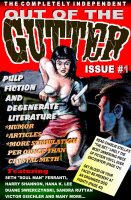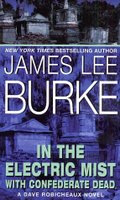 Following on last month’s debut of the semi-annual magazine-cum-book Murdaland: Crime Fiction for the 21st Century comes news that Out of the Gutter (OOTG), another genre print periodical--this one from southern Oregon writer-editor Matthew Louis--will make its premiere appearance on February 1 of next year. Subsequent issues will be published thrice-annually, every four months.
Following on last month’s debut of the semi-annual magazine-cum-book Murdaland: Crime Fiction for the 21st Century comes news that Out of the Gutter (OOTG), another genre print periodical--this one from southern Oregon writer-editor Matthew Louis--will make its premiere appearance on February 1 of next year. Subsequent issues will be published thrice-annually, every four months.Of the first issue--which will include stories by Charlie Stella, Sandra Ruttan, Victor Gischler, Harry Shannon, and others--Louis tells me: “The page count has not been finalized yet, but it will be slightly above, or slightly below, or exactly 200. If the story count I just did is accurate, there are 15 pieces of short fiction, three non-fiction pieces, and then some shorter, humor pieces. The material is arranged into three categories: First, reads that should take roughly 10 minutes [to read]; then, reads that should take 15 to 20 minutes; and finally, reads that should take a half hour or more. The strategy is not only to give a reader unusual and riveting material, but to present it to them in the most accessible and practical way possible, so they can actually make use of it.” Out of the Gutter’s street price is slated at $13.50, and Louis is already taking orders at his Web site. (He’s promised to waive shipping costs “on all advance orders. Twelve bucks straight up.”)
In anticipation of Out of the Gutter’s introduction, I fired off a few questions to Louis, who signs his fiction “MLB”(“The ‘B’ in my name? Let’s say it stands for Bastard.”). He was quick to respond.
J. Kingston Pierce: What sets Out of the Gutter apart from so many other modern crime-fiction mags, both online and in print? Is it simply a matter of your taste as the editor?
Matthew Louis: First off, it was extremely important to me to have this be in print and not online. More than anything else I’m an obsessive reader and I tend to carry a book or two with me wherever I go--not a computer. I’m laying out OOTG so a person can take it with them into a situation where they need a few minutes of distraction, or they can lie down on the couch with an hour or two to kill, and in both instances find the right read.
As far as what sets OOTG apart, beyond its eye-catching visual style, the humor pieces and other extras, I hope that it is primarily a matter of my taste as an editor. No matter how you dress it up, the bottom line is whether or not a person is drawn into a story, compelled to read it through, and satisfied at its conclusion. I went for pieces of fiction with tremendous amounts of attitude, unexpected concepts and, of course, intelligent writing. Like I said, I’m first and foremost an obsessive reader, so what I’m really trying to create is the sort of book I myself would like to have on hand to drag around and crack open whenever I get a minute.
The other thing that sets OOTG apart is the recklessness and sense of fun with which the project is being approached by myself, my deputy editor, Dale Bridges, and assistant editors D.Z. Allen and Billy Elizondo. I personally have no interest in this as a money-making enterprise and I don’t think anyone else involved does either. My goal is simply to create something I can be proud of and to have a blast doing it. In my slightly younger days, when I wasn’t reading I spent my time playing in punk bands, so the idea of doing a lot of work and a lot of hustling and not getting paid for it isn’t anything new to me. Writing songs, recording and mixing demos, designing logos and flyers, promoting shows, etc., etc., isn’t all that different from what’s been involved with getting OOTG off the ground. Both undertakings require a lot of careful work and a huge expenditure of energy, and in the end you’re not likely to make a million but you’re glad for the experience and glad for the people you impressed or, more likely, offended.
JKP: There seems to be a resurgence of interest in pulpish fiction nowadays. To what do you attribute this rediscovery, and do you think it’s only a trend?
ML: I think rather than a random rediscovery and embracing of pulp fiction, it’s a rejection of pseudo-intellectualism and fallacious standards with regard to what is and isn’t art. As an alternative to pulp fiction (broadly defined), you have the material that fills literary journals and the so-called literature on bookstore shelves--and the fact is that most readers have absolutely no use for this stuff. It’s mostly produced by people without real problems and it’s mostly about people without real problems. And it’s mostly mind-numbing. So readers like me who don’t at all limit themselves to private-eye yarns or crime fiction or pulp fiction, nonetheless applaud the straightforwardness of books and stories that fall under these headings. The best situation, in my opinion, is when a writer has the knack for words and interest in human nature that is associated with the word “literature,” and the sense of pacing and love of action that is associated with pulp fiction. This is the balance I have striven to achieve in OOTG.
Do I think the interest in pulp-type fiction is a trend? If it is, I think the trend has been going on since we began generating fiction. Outside of its literal definition having to do, of course, with the paper it was once printed on, pulp fiction refers to fiction aimed at the lowest common denominator; fiction containing much, often gratuitous, sex and violence. When have we humans not loved that?
JKP: How have submissions to OOTG been going? With so many other publications asking for everything and paying nothing, do you find a hunger for more venues such as yours?
ML: Submissions have been phenomenal, as is evidenced by the list of contributors posted on the OOTG site. The thing about asking for everything and paying nothing is that what I’m asking for, writers are eager to provide. I’m not trying to convince them to sell OOTG door to door, I want them to showcase their talent in it. Writing a story is a thrill and having people respond to it is a bigger thrill. Rather than being concerned about how much I (don’t) pay, writers have been overwhelmingly appreciative of the fact that I’m taking the initiative and providing them an outlet for what they love to do.
Regarding the last part of your question, I think there’s a hunger for more unique, fearless and non-corporate venues, and I think there’s a hunger for more print venues. Hopefully, people will buy OOTG and allow me to help fill this vacuum.
JKP: Finally, tell me something about your personal background. What’s your history with publishing and crime fiction?
ML: My writing bio is somewhat limited, but here it is. I began approaching writing as a career choice two years ago. My first year was consumed with writing a novel, The Spirit Penitentiary, about poor white trash fighting, raping, and killing each other in a small, bleak California town. It is currently being shopped around to agents. Having finished my novel, this year I began generating and submitting short stories as a means to build a résumé and gain recognition. I have had some limited success, but my overall impression is there are very, very few print publications to submit short fiction to, and almost none that are interested in the extremely dark, cynical, bloody stories I write. This is why I began putting OOTG together.
I have no background in publishing. I am an autodidact and have no formal education beyond public school (in which I did not do well) and am learning publishing the same way I learn everything else--by rolling up my sleeves and doing it.




























